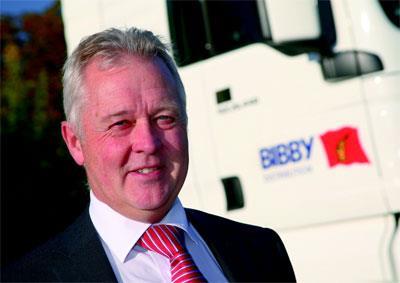
Visiting the Atchison Topeka depot in Droitwitch, now run by Bibby Distribution, it is easy to imagine – after seeing a warehouse full of jam ready to go into a famous biscuit – that they have turned the phrase ‘jam tomorrow and jam yesterday, but never jam today’ on its head. There definitely is jam today.
In three years, Bibby has conducted a remarkable transformation of its business. 2010 was the catalyst: with the triple acquisition of TM Logistics, Taygroup and some of the contracts of collapsed MRS Distribution. In March 2011, it lost its £70m-a-year distribution contract with buying group Nisa to DHL (which secured a seven-year deal).
Bibby pressed on regardless that year with the aforementioned Atchison Topeka deal and then proceeded to spend the majority of 2012 either winning or re-signing contracts. Fairfield FoodTec, Plastic Omnium and Ryvita are just some, not to forget a five regional consolidation centre operation deal with Morrisons.
Bibby chief executive Iain Speak tells MT the business is very different to what it was three years ago. “We have gone from 50 dots on the map to probably 90; our fleet size has doubled; and the number of people has broadly stayed the same, but that is due to losing our historic largest customer. So the business has fundamentally changed.”
Restructure
This year will see Bibby look to move forward following an internal restructure last year. All the acquisition activity, contract wins, renewals and losses cannot go without some changes to the way it does business. It has now divided its operations across four customer sectors: food manufacturing; FMCG; packaging; and paper and industrial.
“We have been buying businesses and expanding, and tipping everything into one big bucket – we needed to organise the bucket to focus on the markets we want to develop. We can then develop real value propositions for those clients instead of trying to be all things to all men,” he says.
Speak wants to play down the term restructure, which, he says, can have slightly negative connotations. It is not negative, he argues, describing it as “positive restructuring”. A major aspect is getting a “one world view” of the whole business, with Bibby about to embark on the implementation of a single transport management system, a process Speak describes as “un-trapping value”.
In August 2012, Paul Kavanagh, formerly MD of Peel Ports Group’s Medway division, was recruited as chief operating officer to, according to Speak, “organise the business into better shape”.
Furthermore, Bibby’s new divisional structure means understanding the way his customers do business. “We are not setting out to just buy more fleet and fill more trucks. That is not what is driving us. If we can leverage our infrastructure, our sites, our high-cube trailers and allow box and can manufacturers to line-feed more efficiently to their customers – who are facing the challenges they are facing – then we are in a better position,” he explains.
Service
The commitment to a four-sector structure does not necessarily mean that Bibby will stick rigidly to those markets. Industrial, for want of a better term, can be used as an incubator for other potential divisions in the future. Where Bibby can provide a service to a market, it won’t restrict itself. “We can’t sit still. We can never sit still,” Speak argues. “We have been able to do this because we are part of a large, privately-owned group that takes a long-term view of doing business.
You cannot have a fairly unique position, but we are in an unusual position compared with our competitors. They are mostly either plcs or private-equity backed where the motivation is relatively short-term compared with ours.”
This approach applies to Bibby’s recent acquisition strategy. Without institutional investors and shareholders, Speak believes that the business can do “the right things at the right time”.
Equally the wind has been in cash-rich Bibby’s direction (it entered the recession debt free); with valuations for acquisitions in 2010 and 2011 well below pre-recession levels, Speak is understated in saying Bibby was ready to take advantage of those market conditions.
“We have been buying good businesses at good valuations, rather than buying businesses because they strategically fit. It wasn’t a strategy to buy something to fit with this depot or that customer and sort it out later,” he explains.
Speak reveals that Bibby conducted research into 100 operators in the market before it started its four-fold acquisition path, but narrowed it down to 36 targets. That resulted in the TM Logistics, Taygroup and Atchison Topeka buys, while picking up the contracts and assets of MRS Distribution was more a case of spotting an opportunity and acting quickly.
When it came to retaining customers during the acquisition process, Speak believes Bibby did not lose a single one. “Some of them did not know us,” he concedes, but they all came on board because, in his opinion, they believed in what Bibby was doing.
Strategy
Clearly, the Nisa contract loss still rankles, and Bibby Group is reported to be considering pulling its 1,700-strong convenience store franchise Costcutter out of Nisa when the deal expires in 2014. But Bibby’s chief executive is not one for panic and, when pressed on Nisa’s switch to DHL, says it did not change Bibby’s strategy at the time. “You have got to be positive and keep your feet on the ground. You have to ask ‘what are the positive things you can do going forward?’ If you lose sight of that, you become bitter and twisted,” he says.
“We occasionally lose customers, but business goes on. We set about planning for the future three years ago and we are planning for the future now.” It’s obviously a case of jam today, and jam tomorrow.













